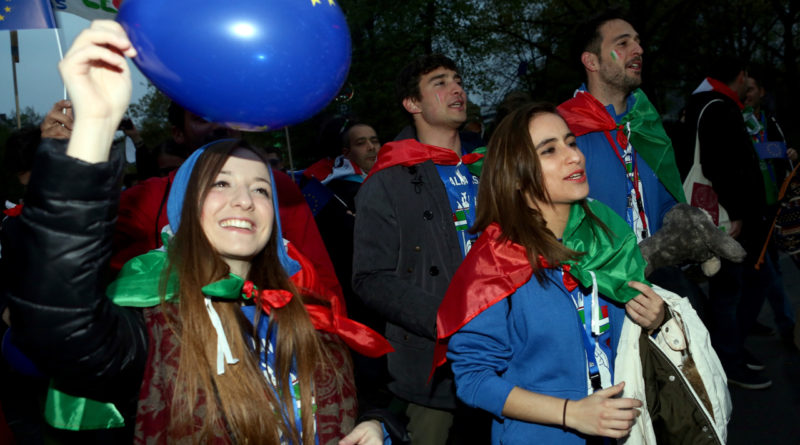Opinion – 25 years from the Maastricht Treaty, let’s open the discussion on EU citizenship
The Maastricht Treaty invented this first modern transnational citizenship, the EU citizenship. Conceived to strengthen the European Union as a political and people’s community, EU citizenship is automatically acquired by citizens of EU countries. It comprises free movement and settlement rights across the EU, voting rights in European election and in local elections in the country of residence, and also consumers, workers and data protection rights on a continental scale.
The Maastricht Treaty came into force 25 years ago, on 1st November 1993. Since then, EU citizenship has surpassed expectations and it is now deeply rooted, legally strong, widely practiced and popular. Europe is, despite the nationalistic climate, a zone of freedom in which young people are “europeanising” their networks and values and sense of solidarity beyond the nation state. They are in the fast lane but the EU institutions are in the slow lane.
As ECIT, a foundation for European citizenship, we have marked this anniversary with a statement on how the concept of European citizenship is to develop. Over the next 25 years it needs to become:
1) A responsibility for citizens themselves. EU citizenship was quickly and discreetly negotiated at Maastricht, a handed down status. Over the next generation it should become more bottom-up, bringing to the attention of the EU the reality on the ground and evidence for change.
2) Linked to other policies. When Spain first proposed Union citizenship, it was to link it to the other new areas being added to the Maastricht Treaty and which were attracting a wide range of European associations: culture, education, public health, youth. I remember running a coalition called VOICE (voluntary organisations in a citizens’ Europe) which pushed for the new policy areas, but they emerged weakened from the negotiations, stripped of legislative clout. In turn, they were overshadowed by the economic and monetary union and a difficult debate, particularly in France and the UK, for the ratification of the Treaty, a debate still raging today. As a result, EU citizenship never found its place across the board in EU polices, something to put right by having a senior commissioner responsible in the next European Commission.
3) Practical and workable. As on the London underground, it as a case of “mind the gap”. On the one hand there has been an impressive affirmation of EU citizenship as real citizenship by the European Court of Justice, by significant legislative development and an anchorage of the concept in the Charter of fundamental rights. On the other hand, the national barriers to freedom of movement persist with no real sign that they are being overcome. It is a positive sign that people are becoming more aware of their rights, but this means they are also more aware of the gap with practice and question the added value of overall idea. The EU Commission deserves more support for its uphill struggle to uphold European law.
4) More political. EU citizenship was seen at Maastricht as a first step and more of a process than a static condition. Making a start by adding to free movement rights the right to vote and stand only in local and European elections in another member state was therefore understandable. It was controversial at the time, especially in countries such as Luxembourg, where large numbers of resident European citizens could change the political landscape. These cross-border political rights have in practice been underused, which is an issue of concern in the run up to the European elections next May. Why, though, is it not possible to vote in regional elections which since Maastricht have become more salient? Why can one not choose to vote in national elections in the country of residence, whilst some cannot vote at all? What about referenda, especially on European issues? Most people wrongly believe that there is no taxation without representation and that we have universal suffrage, because they do not generally make the link between this right and migration.
5) More popular. If you ask people what European citizenship is, they will come up with very different answers. ECIT has tried to bring the scattered elements of European rights, participation and belonging together in guidelines and is also proposing a 10-point manifesto for the European elections. Central to this is the problem that EU citizenship falls short of being a citizenship for all and one of real equal opportunity. For that, everyone should have a right to be informed of their European rights, have access to education from an early age about what it means to be an active European citizen and have the opportunity to put this knowledge into practice. Like any citizenship, it also needs symbols to be popular. We are proposing a European card. Why not a European football team?
6) More inclusive. EU citizenship at Maastricht was greeted by criticism from human rights and migration organisations arguing that it was based solely on being a national of a member state and not on residence, thus excluding 21 million people from other parts of the world resident in Europe. The early debate about who should be a European citizen in the first place has been forgotten and gave way, a decade later, to concerns about absorbing the new EU citizens with enlargement to the East. Now it is relevant again with Brexit. The question of whether the UK divorce should shrink the population of the EU citizenry or be an opportunity to expand it, and not only for British citizens, is coming on the agenda and should be debated. A European citizens’ Initiative (ECI) asking to make European citizenship permanent is encouraging that debate.
Let’s use this anniversary to open up the discussion on the next development of European citizenship.
Tony Venables, Founder and Director of the ECIT Foundation.
Photo: The 2017 Annual General Meeting of the Erasmus Student Network, in Berlin. © European Union, 2017. Source: EC – Audiovisual Service. Photo: Adam Berry.





